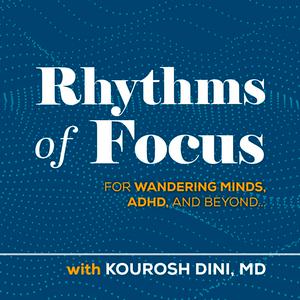Juggling Creation and Confusion
Ever feel like your creativity is both a gift and a juggler’s challenge—especially when you’re navigating the winding paths of ADHD or a wandering mind? In this episode of Rhythms of Focus, we’ll explore how confusion is vital in creativity and how, by embracing it, you can uncover mastery, meaningful work, and joy along your journey.Discover:Why passion is more than a flash of excitement—it’s the steady, nurturing rhythm beneath mastery and meaningful work.The powerful role confusion plays in creative growth (and why learning to “hold” it can lead to breakthrough insights).How daily rhythms of engagement—not rigid productivity hacks—can transform decision overload into meaningful flow.Takeaways:Learn strategies for befriending confusion, using it as a stepping stone rather than an obstacle.Practice the “daily visit” approach to creative work, supporting your mind’s natural curiosity and growth.Recognize moments when play turns into overload, and discover gentle ways to restore clarity and self-compassion.Plus, this episode features an original piano composition—“Flagrant Air Biscuit”—capping off our exploration with musical playfulness.Subscribe to Rhythms of Focus and visit rhythmsoffocus.com for more episodes, resources, and inspiration fostering mindful, agency-driven creativity.Keywords#ADHD #WanderingMinds #Creativity #Confusion #MindfulProductivity #PlayfulFocus #MasteryJourney #MeaningfulWork #DailyRhythms #PianoCompositionTranscriptWhat about Passion? Challenge, interests, novelty, urgency, passion. These are often considered five grounding ideas for a wandering mind as Dr. Dodson once mentioned.But I find that passion is not often talked about. It's about mastery, meaningful work, craft skill, and exploration over time, when we feel that we are developing mastery and meaningful work in our lives, there's a sense of regular engagement, motion, this organizing foundation to our days. It helps bring the inner critic to a quieter place. The seas seem more settled.On the other side of it too, what we create. I think there's a phrase for it, which is "good work". So how do we foster good work? On Writing a Good BookA listener recently wrote to me about my writing process. He read my book, Taking Smart Notes with DEVONthink. He thought it was a good book. Several people have told me so. If I may be so bold, I think it's a good book, too.So the question then is how do you write a good book? It's really the same question that goes into doing anything you try to do well.My answer, which I gave to this listener and which I liked enough to save for this podcast, was that I dragged notes from DEVONthink, this file management and note management software into Scrivener, this software for writing, and then cut up those notes, rearrange them, look for commonalities between pieces, see if some structure starts to arise, and then realize it doesn't work or it's boring, or I've said the same thing multiple times.I don't know where to cut. The order of parts is plain wrong, and so sometimes I scream, sometimes even internally. Then I go to sleep. Then the next morning, something new comes to mind. I write that material, realize I now have more to cut and edit, scream again, rearrange the stuff, try it all again, sometimes in that order.At some point my internal compass says, dude, that's enough. So I slap a price tag on it, put it up for sale, and have a panic attack, and then you have a book. Sometimes it's a good book.The short answer, however, is that I've learned how to handle confusion. I've learned how to hold confusion, and that is a vital skill for a wandering mind, particularly when you want to find mastery and meaningful work. Good work.Creativity, Play, and the Wandering...


